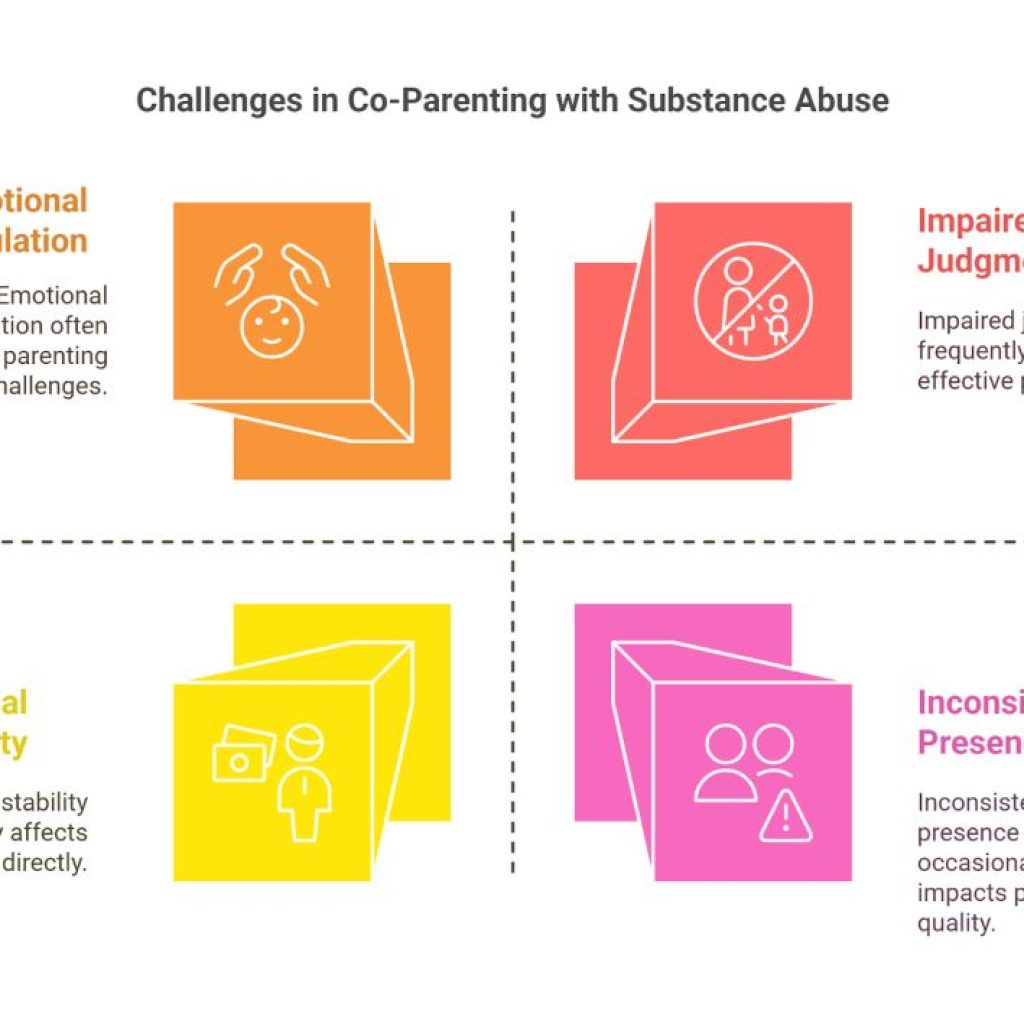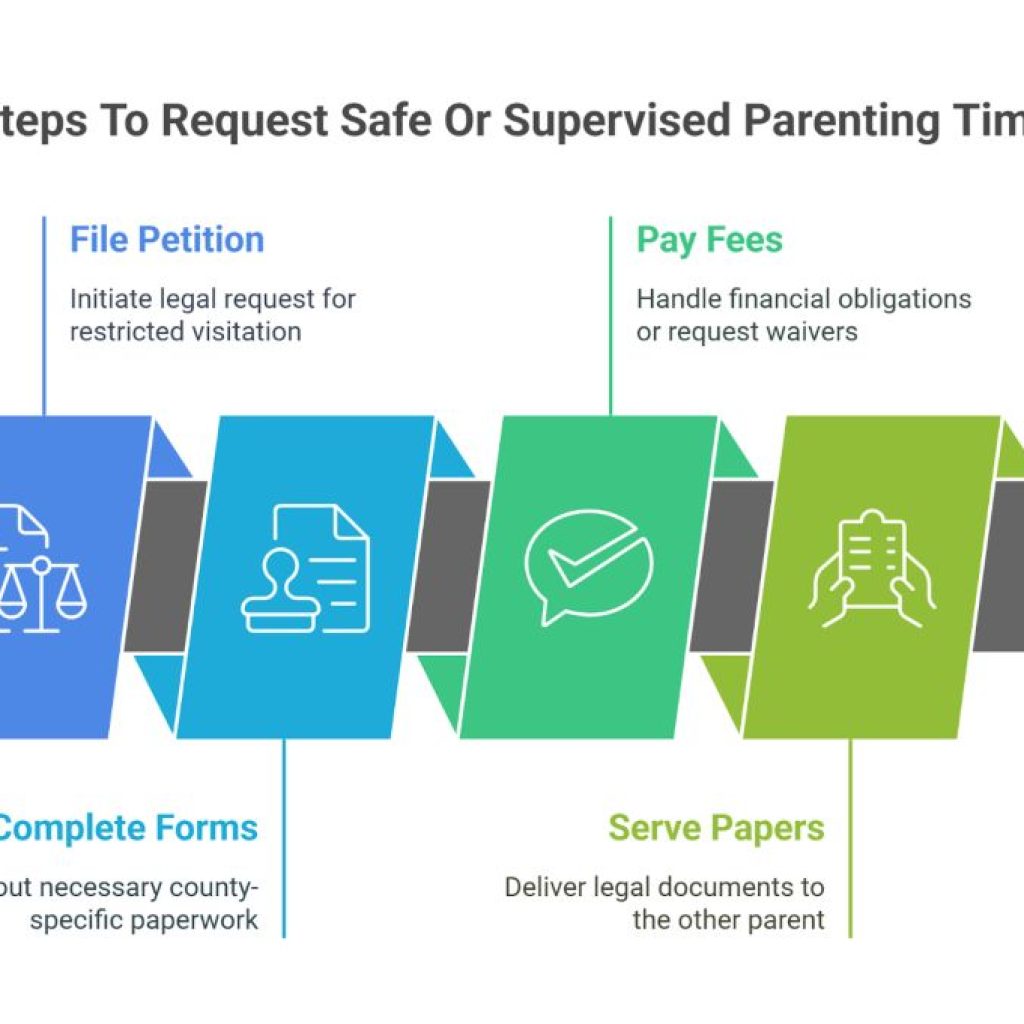

Originally published: April 2025 | Updated: August 2025
Navigating co-parenting with someone struggling with substance abuse presents unique challenges that can feel overwhelming.
When alcohol or drugs affect a parent’s behavior, it’s natural to worry about your children’s safety during their time with the other parent.
Creating a safe environment for your children doesn’t mean completely cutting off their other parent.
Many courts support parents actively working toward recovery while ensuring children remain protected.
Options like supervised visits, safety-focused parenting plans, and substance testing can create structure that benefits everyone involved.
With proper legal guidance and appropriate safeguards, families can navigate these difficult waters while prioritizing what matters most—the children’s well-being and security.

Co-parenting with someone struggling with substance abuse creates unique challenges that can significantly impact both the children and family dynamics.
These situations require careful handling to ensure children remain safe while maintaining appropriate relationships with both parents.
Substance abuse directly affects a person’s ability to parent effectively. When a parent is under the influence, their judgment becomes impaired, reaction times slow, and emotional regulation suffers.
According to the Substance Abuse and Mental Health Services Administration (SAMHSA), 1 in 8 children in the U.S. live with a parent who has a substance use disorder (SAMHSA, 2022).
This affects custody decisions both during and after divorce proceedings.
Addicted parents often struggle with:
Children need structure and stability to thrive. When addiction disrupts routines, children experience heightened anxiety and insecurity. In severe cases, a parent may lose custody due to their inability to provide proper care.
Children of parents with substance use disorders face both immediate and long-term risks.
The unpredictable nature of addiction creates an environment where children never know what to expect.
Physical risks include:
Emotional impacts are equally serious:
Research shows children in these situations often develop coping mechanisms that may be unhealthy.
They might become hypervigilant, watching for signs of intoxication, or develop people-pleasing behaviors to avoid conflict.
Navigating co-parenting in these circumstances requires focusing primarily on what’s best for the child.
Co-parenting with someone battling addiction isn’t easy. Contact Cooper Trachtenberg Law Group today to schedule a confidential consultation with a family law attorney who prioritizes your child’s safety.
If you’re ready to get started, call us now!
Illinois courts follow specific legal standards when determining parenting time arrangements, especially in cases involving substance abuse.
These standards prioritize child safety while recognizing the importance of maintaining parent-child relationships when appropriate.
In Illinois, courts determine parenting time according to the child’s best interests. This standard considers multiple factors, including the child’s needs, the quality of the parent-child relationship, and the parent’s ability to cooperate.
The court examines each parent’s willingness to facilitate a relationship between the child and the other parent. This becomes particularly important when substance abuse is involved.
The child’s physical health, safety, and emotional well-being are primary considerations. Courts evaluate each parent’s ability to provide a stable, nurturing environment.
Other factors include the child’s adjustment to home and school, parents’ work schedules, and the child’s reasonable preference depending on their age and maturity.
Substance abuse significantly impacts parenting time decisions in Illinois. When a parent struggles with addiction, courts may restrict parental responsibilities if evidence shows the behavior endangers the child’s physical or emotional health.
Courts can order several protective measures:
Parenting time restrictions must be proportional to the risk posed. The goal remains to maintain the parent-child relationship when it is safe to do so.
Parents dealing with substance abuse issues in custody disputes should seek treatment proactively, as courts view this favorably when evaluating a parent’s commitment to their child’s well-being.

When your children’s safety is at risk due to a co-parent’s substance abuse, taking legal action to establish safe parenting arrangements becomes necessary.
Courts generally favor parental involvement but prioritize child safety above all else.
Building a strong case starts with thorough documentation. Keep a detailed log of concerning incidents related to your co-parent’s substance abuse, including:
Text messages, emails, and social media posts can be valuable evidence. Illinois courts take substance abuse impacts on child custody seriously when documented properly.
Consider requesting drug testing if appropriate. Document missed visitations, late pickups/drop-offs, or appearances where the parent seemed impaired.
In Illinois, a parent can file for restricted parenting time when substance abuse creates safety concerns. This typically involves:
Be prepared to explain specifically how the substance abuse endangers your child. Courts may order different levels of supervision depending on risk severity:
Remember that courts aim to protect children while supporting parents in recovery. Presenting your concerns with evidence rather than accusations will strengthen your case.
Need to request supervised parenting time or restrict access due to substance abuse? Schedule a call with Cooper Trachtenberg Law Group to discuss legal steps to safeguard your parenting rights.
If you’re ready to get started, call us now!
Family courts prioritize child safety when handling cases involving parental substance abuse.
Judges examine specific evidence and patterns to determine appropriate custody arrangements that protect children while respecting parental rights.
Courts require substantial proof when evaluating substance abuse allegations.
Medical documentation from professionals, such as treatment records or clinical diagnoses, carries significant weight in these proceedings.
Drug test results are highly valued evidence. Courts may order random testing or ongoing monitoring to verify sobriety.
In Illinois, family courts often require multiple clean tests over time before modifying restrictive custody orders.
Documented patterns hold more significance than isolated incidents. This includes:
Family law courts may also order professional substance abuse evaluations to assess the severity of the problem and its impact on parenting abilities.
Many parents incorrectly assume that any evidence of substance use automatically results in loss of custody.
Judges typically try to maintain parent-child relationships while implementing appropriate safeguards.
Another misconception is that informal evidence like social media photos is sufficient proof.
While these may support a case, courts generally require more substantial documentation showing how the substance abuse directly affects parenting.
Parents often believe past addiction permanently disqualifies someone from custody. However, courts recognize recovery is possible.
A parent who demonstrates sobriety and completes court-ordered treatment programs can often regain expanded parenting time.
Many also misunderstand the purpose of supervised visitation, viewing it as punishment rather than a protective measure.
However, courts implement supervision as a temporary safety measure while a parent works toward recovery.
When co-parenting with someone struggling with substance abuse, implementing proper monitoring and safety measures can provide peace of mind and protect your children’s well-being.
These tools create accountability and structure during parenting time.
Illinois offers several supervised visitation centers designed specifically for families affected by substance abuse issues.
These centers provide safe, neutral environments where trained professionals monitor parent-child interactions.
In Cook County, facilities like Chicago’s Family Visitation Centers offer structured supervision with staff trained to recognize signs of substance impairment. Parents can expect a thorough intake process that reviews court orders and establishes clear visitation rules.
Many centers follow a graduated supervision model. This model allows parents who demonstrate consistent sobriety to progress toward less restrictive visitation arrangements.
This approach rewards positive behavior while maintaining safety.
For families dealing with court-ordered substance abuse monitoring, these centers often work in conjunction with testing programs. They share information with the court when authorized.
Modern technology provides innovative solutions for monitoring sobriety during parenting time.
Remote breath alcohol testing devices like Soberlink allow real-time monitoring without constant in-person supervision.
These systems work by:
Drug and alcohol testing programs can be integrated into parenting plans with clearly defined consequences for positive or missed tests.
Illinois courts typically require testing through approved facilities with chain-of-custody protocols to ensure admissible results.
Parents can also utilize communication apps designed for high-conflict co-parenting situations.
These platforms document all exchanges and provide transparency about pick-up, drop-off, and parenting time activities.
When facing custody issues with a substance-abusing co-parent, having experienced legal guidance is crucial.
Cooper Trachtenberg Law Group offers specialized support for families navigating these complex situations.
Cooper Trachtenberg Law Group offers comprehensive family law solutions. Their attorneys aim to protect children while establishing workable co-parenting arrangements.
Their attorneys understand the delicate balance between maintaining parent-child relationships and ensuring safety.
The firm can help create custody arrangements that include:
Their attorneys work closely with families to document substance abuse concerns properly. They can connect clients with valuable resources like family therapists and substance abuse professionals.
The team at Cooper Trachtenberg recognizes that building successful co-parenting relationships requires patience and structure.
They advocate for arrangements that provide stability for children while supporting the recovery journey of the substance-abusing parent when possible.
Your child’s well-being comes first. Call Cooper Trachtenberg Law Group to schedule a child custody consultation and build a parenting plan that prioritizes protection and structure.
Can I limit my co-parent’s parenting time if they are using drugs?
Yes. In Illinois, you can request restricted or supervised parenting time if substance use seriously endangers the child’s physical, emotional, or mental well-being.
What evidence do I need to prove my co-parent has a substance abuse problem?
Courts consider drug test results, police records, medical documents, missed visits, and credible third-party testimony as valid evidence of substance abuse.
Can Illinois courts order supervised visitation?
Yes. Under Illinois law, judges can order supervised visitation if a parent’s substance use poses a risk. Visits are held at approved centers or under professional supervision.
How does addiction impact parenting decisions in Illinois custody cases?
Addiction can affect parenting time, but not always legal custody. Before restricting parental rights, the court will assess whether the behavior endangers the child.
Will my child have to testify about the other parent’s addiction?
Rarely. Illinois courts aim to shield children from courtroom involvement. A Guardian ad Litem or child representative is typically appointed to speak for the child.
What happens if my co-parent relapses after a court agreement is in place?
If relapse endangers the child, you can file for a modification or emergency restriction of parenting time. Documentation is key to securing fast legal action.
Can I request drug testing for my co-parent during custody proceedings?
Yes. Courts may order random or scheduled drug testing if substance abuse is a concern and impacts the child’s safety or parenting arrangement.